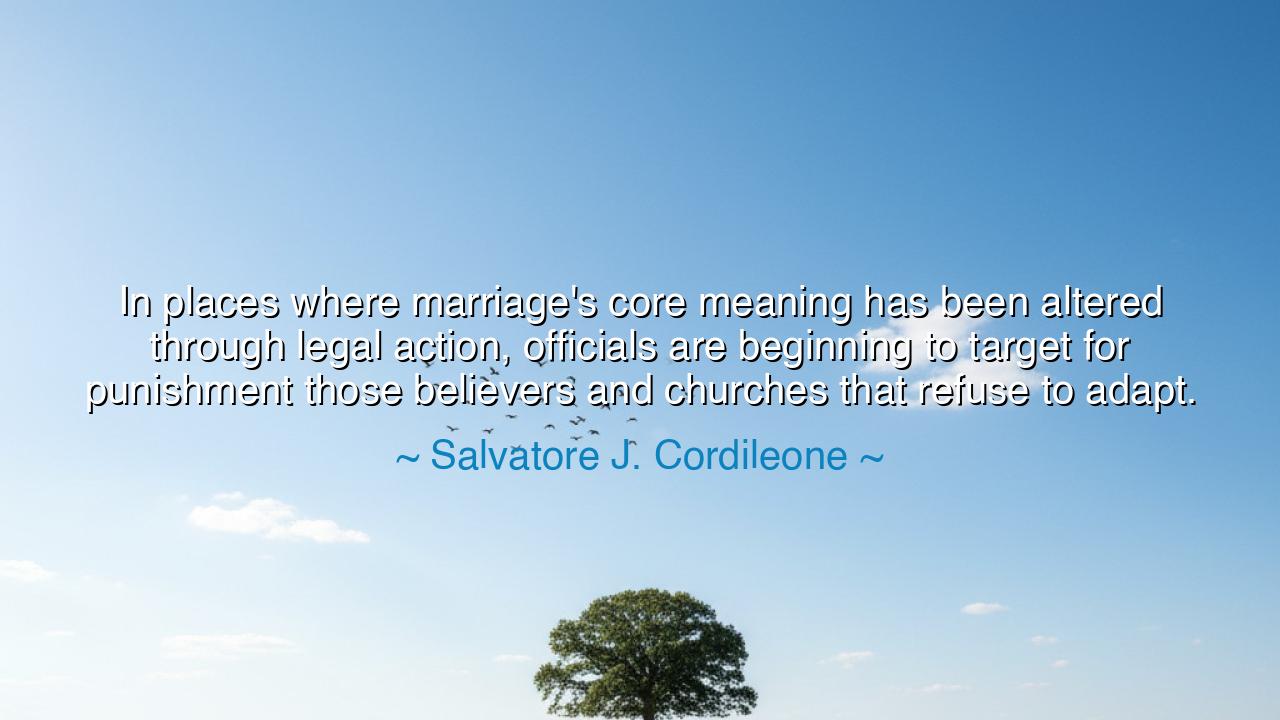
In places where marriage's core meaning has been altered through
In places where marriage's core meaning has been altered through legal action, officials are beginning to target for punishment those believers and churches that refuse to adapt.






Hear the words of Salvatore J. Cordileone, a shepherd of his church and defender of tradition, who declared: “In places where marriage’s core meaning has been altered through legal action, officials are beginning to target for punishment those believers and churches that refuse to adapt.” In this saying lies the anguish of a man who sees not only a change in law, but a deep struggle over the soul of society, where ancient customs and modern decrees collide, and where conscience itself is placed upon the scales of judgment.
The origin of this saying rests in the debates that arose in the United States and beyond during the early 21st century, when governments and courts moved to redefine the legal meaning of marriage. For centuries, marriage had been seen through the lens of religion, as a sacred covenant between man and woman. Yet through legal action, civil authorities expanded this definition, granting recognition and protection to unions once denied. To some, this was a triumph of justice and equality; to others, like Cordileone, it was the unraveling of a truth rooted in divine order.
His warning speaks to the consequences he perceived: that once the legal meaning of marriage shifted, those who held fast to older beliefs would not be left alone. The laws of the state, wielded by officials, might press upon believers and churches, demanding conformity where conscience forbids it. In Cordileone’s eyes, what began as legal recognition risked becoming legal compulsion, where refusal to adapt could invite scorn, exclusion, or even punishment.
History gives us echoes of such conflict. Recall the age of Henry VIII, when the king of England broke with Rome and demanded that clergy and citizens alike accept his new order. Those who refused—saints like Thomas More—were condemned, not because they broke laws of morality, but because their beliefs stood against the legal action of the crown. Or recall the struggles of early Christians in Rome, who were told to offer incense to Caesar. Their refusal was not rebellion against society, but fidelity to conscience—and for that, they suffered. These tales are reminders that when law and faith clash, the burden upon conscience is immense.
Cordileone’s words are not spoken only in defense of marriage, but in defense of freedom of belief. His warning is that when a state compels conformity on matters of sacred conviction, it risks crossing from governance into domination. To preserve peace among diverse peoples, there must be room for dissent—room for churches and communities to hold to their truths without fear of reprisal. For without this, unity becomes tyranny, and harmony becomes silence.
The lesson for us is not merely about marriage, but about the fragile balance between law and conscience. In a free society, there will always be differences of conviction. The test of justice is not whether the majority can enforce its will, but whether it can make space for the minority to live in fidelity to conscience. To deny this space is to sow bitterness, division, and resistance. To grant it is to build a society where people may disagree deeply, yet still live in peace.
And what shall we do in our own lives? We must learn to walk with both conviction and humility. Hold fast to your beliefs, but do not wield them as weapons. Respect the laws of the land, but never surrender your conscience to them without thought. Defend the rights of others to live their faith—even if it is not your own—for in doing so, you defend your own freedom as well. Teach your children that true strength lies not in forcing others to believe as you do, but in remaining steadfast when others would force you to yield.
So remember the teaching of Salvatore J. Cordileone: when legal action changes the meaning of ancient things, the test begins—not only for those who welcome change, but for those who resist it. Do not let officials or rulers strip away the dignity of conscience. Guard it as a treasure, for it is the root of both faith and freedom. A society that punishes believers for holding true to their convictions may gain uniformity, but it will lose its soul. Better, then, to endure difference with patience than to enforce silence with law.






AAdministratorAdministrator
Welcome, honored guests. Please leave a comment, we will respond soon